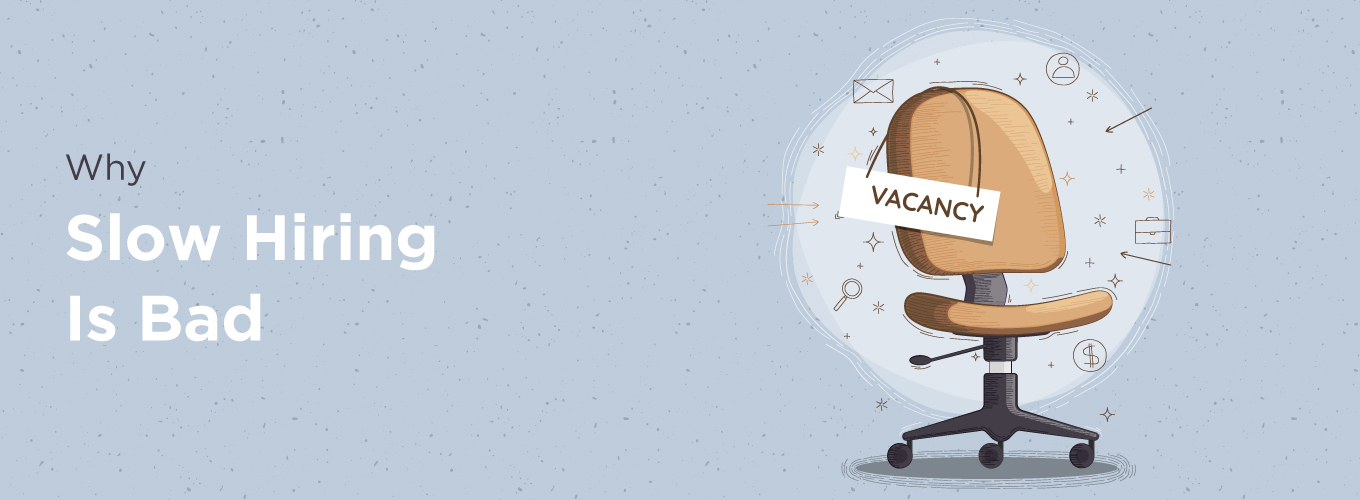Why Slow Hiring Is Bad
Irrespective of whether you are a small business or a large corporate house, the consequences of slow hiring is the same for both entities. Slow hiring decisions result in the best candidates losing interest. They end up taking up offers from whoever gets to them first with a good offer. Most good quality candidates do not have to hunt for a job or apply for one since job offers come to them.
Slow hiring reflects poorly on the organization and shows indecision, poor organization, long drawn-out interview process and the fear of making a bad hiring decision. A slow hiring process will result in getting poor quality candidates and selecting from a pool of candidates who are not top performers. You need to increase productivity, get top executive buy-in on need for speed in the hiring process and reach the top talent.
How long should the hiring process take?
There is no one answer to this question, but hiring can take anywhere from one week to one month to complete. The length of the process depends on the position that the company is hiring for and the quality of candidates they are looking to hire. For instance, entry level service positions can be filled within a week or two. Positions that require candidates with specific skill sets will take longer. Using the services of a recruitment agency can quicken the process since they will give you a list of good candidates, leaving the average ones out, so that you can interview and make a decision quickly.
How can slow hiring affect your company?
Taking a long time in the process of finding the best candidate can hamper the hiring process. Instead, if you speed up the process, you will get good candidates. There are several negative effects of a slow hiring process. They are outlined below.
-
Low quality hires
When your hiring process is slow, candidates are evaluating multiple offers and may not decline a current offer in favor of a future one that you may be planning to give them. Good candidates get snapped up fast and you may lose top talent to competitors because of your slow hiring process. The speed of hiring is important particularly in tech companies where good candidates are gone before you realize it. When you hire low quality candidates, they end up having a shorter tenure in your company and you ultimately spend a higher amount on recruiting fresh talent.
-
Revenue loss
Slow hiring results in revenue loss that an employee would generate directly or indirectly. While this loss is more visible in sales jobs, even in other roles, projects are delayed or sometimes missed altogether because of not having the talent to deliver them. This results not only in loss of revenue but also loss of customers. A longer hiring process also results in even mediocre candidates having multiple offers which often ends up in a bidding war. This will result in the company overpaying for an average performer. Thus, slow hiring results not only in the loss of talent but also loss in terms of opportunity and revenue.
-
Lost competitive advantage and low productivity
One way to boost revenue is to have workforce planning and talent pipelines. When you have a pipeline of candidates ready, you save time, effort, and money. This is important, especially in roles where recurring hiring happens. Low productivity and the loss of opportunity to get things done result when a position is vacant for a long time. Having many positions open due to slow hiring can impact the productivity and morale of the whole team. This is because they are given extra responsibilities related to the open positions.
-
Poor employer image
A long and tedious interview and hiring process results in poor candidate experience. Candidates tend to share their experiences with peers and other people (some of whom may even be your customers). It ends up becoming a topic of discussion in the entire community of talent that is being hired. When you have a lengthy interview process and then arrive at the fact that the person is not suitable for the position, you are wasting not only your time but also the time of the candidate. A good process which can quickly arrive at the same decision will be prudent and beneficial for everyone involved.
-
Low team morale and stress
Positions that are open for a long time, result in stress and arduous work for the rest of the team since they are required to fill for two or more people sometimes. This can quickly snowball and lead to various other problems. This results in mistakes on the job, poor productivity, negativity and increased staff turnover. It may also result in having to pay these employees more or hire someone temporarily to take care of things. Therefore, hiring quickly and filling a position is important, else you may end up having to fill more positions.
-
Harm your employer brand
While a good recruitment process can enhance your employer branding, the converse is also possible. Candidates who have a negative experience end up sharing their experience which can harm your brand. Some of them write reviews on platforms talking about their negative candidate experience and this can harm your brand very badly and deter future applicants.
Conclusion
Slow hiring affects your employees, customers, revenue earning capability,and most importantly, your brand image. A good and quick hiring process can help your company grow and adapt quickly. You need to ensure that your recruitment process is fast, efficient, and effective. There are technical screening services available that can help you not only hire faster but also save time and money. The competitive landscape is too fierce to have losses due to slow hiring.









